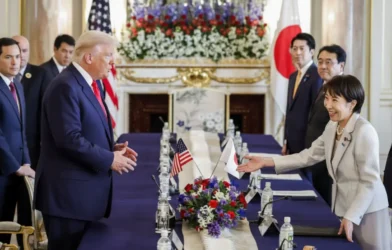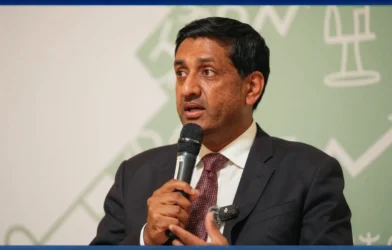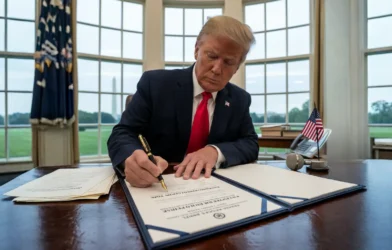Author: Aditya Pareek | EQMint | General News
November 12, 2025 – In a candid admission that contrasts with his administration’s hardline immigration stance, US President Donald Trump said the country does not have enough skilled workers to meet its growing labour demands. Speaking in an interview with Fox News host Laura Ingraham on Tuesday, Trump defended the need for foreign professionals, particularly through H-1B visas, even as his government enforces stricter rules around the programme.
When pressed about whether prioritising foreign talent undermines his pledge to raise wages for American workers, Trump responded directly: “You also do have to bring in talent.” Ingraham countered by saying that the US already had “plenty of talented people here.” Trump disagreed, replying simply, “No.”
“You don’t have certain talents,” Trump added. “You can’t take people off an unemployment line and say, ‘I’m going to put you into a factory. We’re going to make missiles.’ People have to learn — you need skilled talent.”
Background: The H-1B Visa Debate
The H-1B visa programme, designed to allow US companies to hire foreign professionals in specialized fields such as technology, engineering, and medicine, has long been a flashpoint in the country’s immigration and labour policy debate.
Earlier this year, Trump’s administration introduced a $100,000 application fee for H-1B visas — a move that drew significant backlash from the business community. Tech giants and the US Chamber of Commerce argued that such a policy would discourage innovation and make it harder for American firms to access the global talent pool needed to stay competitive.
In response, the Chamber of Commerce filed a lawsuit against the administration, marking one of the most visible clashes between corporate America and Trump’s second-term immigration strategy.
Balancing Protectionism and Labour Demand
While Trump continues to position himself as a champion of American workers, his latest remarks underscore a growing dilemma facing the US economy: an increasing shortage of skilled labour across sectors, from manufacturing and defence to information technology.
His administration’s crackdown on illegal immigration and tightening of visa categories have led to labour shortages in several industries. Businesses in fields such as construction, healthcare, and advanced manufacturing have reported difficulty finding qualified candidates, forcing many to look overseas for skilled talent.
The contradiction between protectionist policies and economic necessity reflects a broader trend — the US labour market’s struggle to meet technological and industrial demands amid a declining domestic talent pipeline.
Trump’s Allies Push Back Against H-1B Programme
Despite Trump’s remarks, not all members of his political circle share his openness to skilled immigration. The US Department of Labor recently launched a campaign accusing companies of misusing the H-1B visas system by replacing young American workers with foreign employees.
In an official statement, the department said: “Young Americans have had the American Dream stolen from them, as jobs have been replaced by foreign workers due to rampant abuse of the H-1B visas.”
A new campaign video released by the department reinforced this message, with a narrator declaring that “for generations, Americans were told that if they worked hard, they could achieve the American Dream. But many young Americans have had this dream stolen from them.” The video praised Trump and Labour Secretary Lori Chavez-DeRemer for “putting America first.”
The campaign appears to target tech companies and outsourcing firms, with India specifically named as the largest beneficiary of the programme. Indian IT giants such as Infosys, Wipro, and Tata Consultancy Services (TCS) have long been among the top recipients of H-1B visas, placing them squarely in the middle of the political crossfire.
Governors Add to the Criticism
Adding to the debate, Florida Governor Ron DeSantis — a prominent Trump ally — has labelled the H-1B visa programme a “total scam.” In a recent Fox News interview, he criticised the dominance of Indian applicants, stating, “Most of them are from one country, India. There’s a cottage industry around how people make money off this system.”
DeSantis also claimed that many American workers are being forced to train their replacements — foreign employees brought in under H-1B visas — before being laid off. His comments echo long-standing concerns among labour unions and nationalist policy groups who argue that the programme undermines American job security.
Economic Context: The Reality of Skill Shortages
Despite political disagreements, data supports Trump’s assertion that the US faces a significant skills gap. According to reports from the US Bureau of Labor Statistics, there are millions of unfilled positions in fields such as cybersecurity, advanced manufacturing, and clean energy technology — sectors that require specialised education and training that domestic supply often cannot meet.
Industry analysts warn that tightening immigration rules could worsen the talent crisis, especially as global competition for skilled workers intensifies. Countries like Canada, the UK, and Australia have actively expanded their skilled immigration pathways to attract global professionals — a move that may lure talent away from the United States.
The Global Impact and India’s Role
For India, which sends tens of thousands of highly skilled engineers and IT professionals to the US each year, the H-1B visas debate carries major implications. The visa programme has been a cornerstone of US-India technology ties, supporting both American innovation and India’s tech-driven economy through remittances and global exposure.
If Trump’s administration maintains a mixed stance — restricting visas on one hand while acknowledging their necessity on the other — Indian professionals may continue to face uncertainty about their prospects in the United States.
Conclusion: A Conflicted Policy at a Critical Time
President Trump’s remarks signal a rare acknowledgment of economic reality: America needs global talent to remain competitive. However, his administration’s simultaneous push to limit immigration and penalize companies for hiring foreign workers paints a conflicted picture.
As the US economy transitions toward high-tech manufacturing, artificial intelligence, and clean energy industries, the demand for specialised skills will only grow. Policymakers now face a crucial question — can America maintain its “hire American” ethos while relying on the very foreign talent it seeks to restrict?
For more such information visit EQMint
Disclaimer: This article is based on information available from public sources. It has not been reported by EQMint journalists. EQMint has compiled and presented the content for informational purposes only and does not guarantee its accuracy or completeness. Readers are advised to verify details independently before relying on them.









